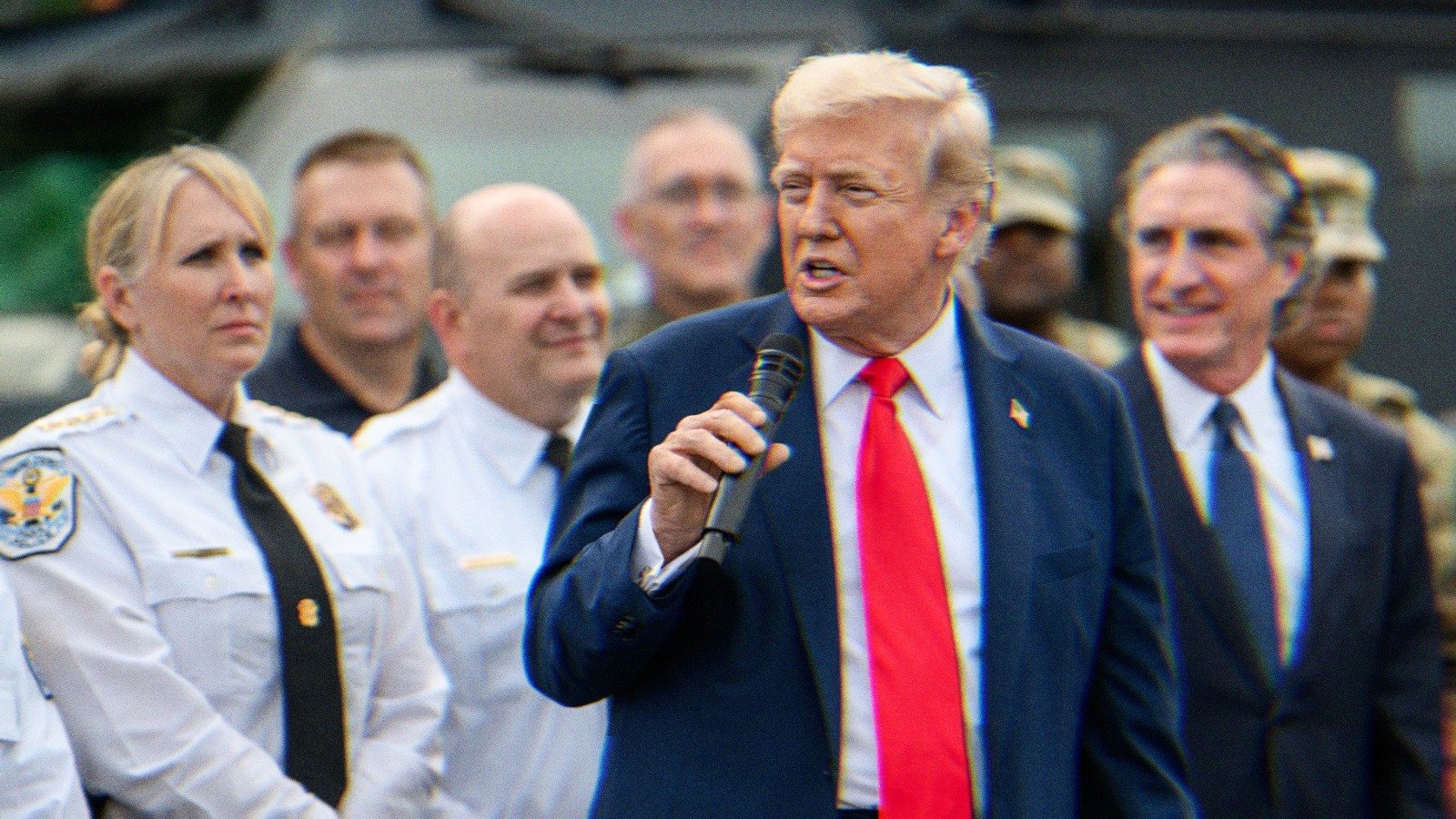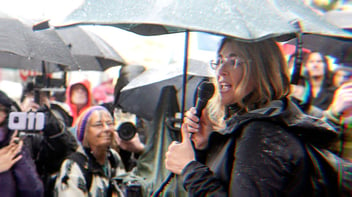Trump’s Power Grab—The American Monarch Has Arrived
 Image Description: Trump visits law enforcement and members of the National Guard at the U. S. Park Police Anacostia Operations Facility. He stands holding a microphone, speaking to a crowd.
Image Description: Trump visits law enforcement and members of the National Guard at the U. S. Park Police Anacostia Operations Facility. He stands holding a microphone, speaking to a crowd.
There’s a popular phrase that best sums up Donald Trump’s strategy this time around as president: He simply doesn’t give any—well, you can complete the rest of the sentence.
This is not to trivialize Trump’s despotic run, only eight months into his second presidency, but to underscore the awesome nature of the moment.
Contrast everything we’ve already experienced under Trump 2.0—the massive attacks on civil liberties, the disappearing of immigrants, the bending of private institutions to his will, and much more—with the fight, or lack thereof, from the upper echelon of the Democratic Party.
Meanwhile, notice how they’ve been visibly more animated by the meteoric rise of New York City mayoral candidate Zohran Mamdani—easily the most inspirational figure on the left today outside of perennial favorite Sen. Bernie Sanders—than they have been by Trump’s despotic rise, an ostensible concern Democrats have only paid lip service to for at least a decade.
Militarizing the Homeland
This is all to say there’s no institutional force standing up to Trump—a dangerous prospect considering his move to militarize the U.S. homeland, a pilot project he first adopted in Los Angeles before overseeing the ongoing federal occupation of Washington, D.C.
While the public justification for Trump’s mobilizing of the National Guard and federalizing the Metropolitan Police Department was to curtail crime, which has been in decline, the real reason isn’t difficult to decipher: to leverage the federal government’s unique powers in D.C.—highly suspect even in this case—to normalize the deployment of military assets to other U.S. cities, putting these famously Democratic jurisdictions under his thumb.
Broken Windows, Supercharged
To pull this off, Trump, a creature of New York City politics, is mirroring the discredited broken windows policing philosophy made famous by former NYPD Commissioner Bill Bratton in the early 1990s, which targeted homelessness, property crimes, graffiti and other low-level crimes, but never to this potential scale.
The idea is to saturate communities with law enforcement so their presence alone creates the “illusion of order.” The reverse happened in cities where “Broken Windows” was adopted, including in Newark, N.J., where it contributed to a fracturing of the relationship between police and the community.
In New York City, considered the birthplace of the philosophy, a 2016 NYPD Inspector General report found “no empirical evidence demonstrating a clear and direct link between an increase in summons and misdemeanor arrest activity and a related drop in felony crime.”
Alas, few politicians let empirical evidence get in the way of a good propaganda campaign—especially, as some have suggested, to distract from politically inconvenient scandals, such as the quashing of the previously much-ballyhooed investigation into convicted pedophile Jeffrey Epstein’s client list.
While the media, for good reason, has latched onto Trump’s taunts of turning Blue-blooded cities into a playground for his autocratic impulses, it helped distract from a potentially consequential executive order that the president signed on Monday (among a slew of other law-and-order-related Executive Branch missives).
To be sure, you should take time to read it in full, but the directive, which alludes to a non-existent “crime emergency” in D.C., empowers Secretary of Defense Pete Hegseth to form a “specialized unit” within the D.C. National Guard for public safety and enforcement of federal law and to ready a “quick reaction force” from the National Guard that would be prepared for “rapid nationwide deployment.”
The former is a scary proposition and the latter is utterly perplexing, given that the federal government’s authority doesn’t supersede state law with respect to National Guard troops. It’s one thing for the federal government to give the D.C. branch orders, but another entirely when it comes to state troops.
And that isn’t even the most shocking element of the EO.
The Trump Militia
Among the directives that have gone wildly under-reported, the administration is seeking to deputize citizens and parachute them into D.C. and “other cities where public safety and order have been lost.”
Per the EO, the so-called “D.C. Safe and Beautiful Task Force” created under Trump’s initial militarization of D.C. directive, “shall establish an online portal for Americans with law enforcement or other relevant backgrounds and experience to apply to join Federal law enforcement entities.” So, in a sense, Trump wants to create his own personal militia that he can deploy across the United States as a show of force.
And there’s more. The order pressures landlords in D.C. to, in effect, act as enforcers to ensure they don’t become the focus of criminal investigations (a policy we can easily see being cloned in other cities). Here’s the relevant portion:
The Secretary of Housing and Urban Development (HUD) shall investigate any non-compliance with the crime-prevention and safety requirements of HUD agreements by the District of Columbia Housing Authority or any landlord in the District of Columbia. These investigations shall include consideration of the provisions of such agreements that require housing providers to maintain safe, decent, and sanitary conditions or to restrict tenants who engage in criminal activity that threatens health, safety, and the right to peaceful enjoyment for other tenants, including engaging in drug distribution, violent criminal activity, and domestic violence. The Secretary of HUD shall refer any findings of non-compliance to the Attorney General, Federal law enforcement authorities, the District of Columbia Housing Authority Police Department, and the Metropolitan Police Department, as appropriate.
For good measure, Trump ended the day Monday by ordering the prosecution of anyone who burns the American flag, a long-held free speech protection. The administration tried to couch the language by citing something called “content-neutral laws” while attempting to redefine flag burning as a violent crime, as opposed to an act of free expression.
Trump’s imperial ascent stands in stark contrast to GOP posturing over free speech and federal encroachment on states’ rights during the Obama years.
Power, as it often does, reveals people’s true colors, and for the Trump-owned GOP, their fight was never about supposedly cherished freedoms, but institutionalizing control.
Trump has always been a dominating force, mostly a product of his ubiquity in the media. However, this time it’s something entirely different.
Trump is more than just president—he’s America’s police commissioner, deporter-in-chief and free speech czar.
He’s all-consuming. A monarch hiding behind a presidential seal.
Image Source
- The White House, Public domain, via Wikimedia Commons. Changes were made.
Rashed Mian is the managing editor of the award-winning News Beat podcast and co-founder of the newly launched Free The Press (FTP) Substack newsletter. Throughout his career, he has reported on a wide range of issues, with a particular focus on civil liberties, systemic injustice and U.S. hegemony. You can find Rashed on X @rashedmian and on Bluesky @rashedmian.bsky.social.


